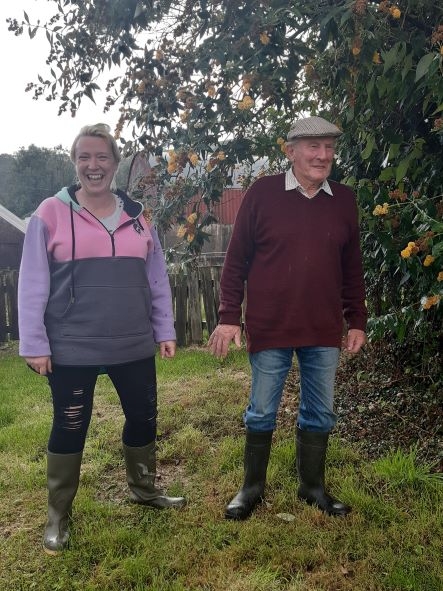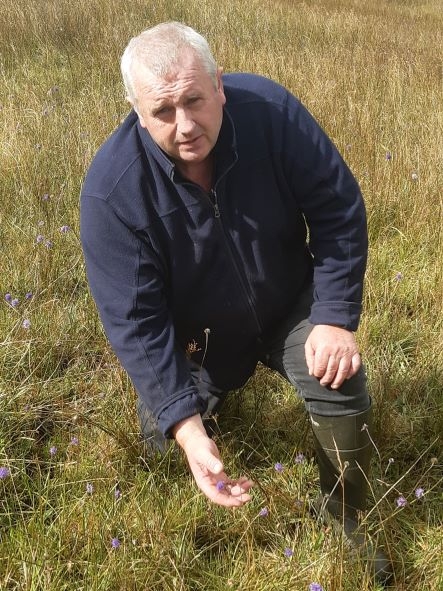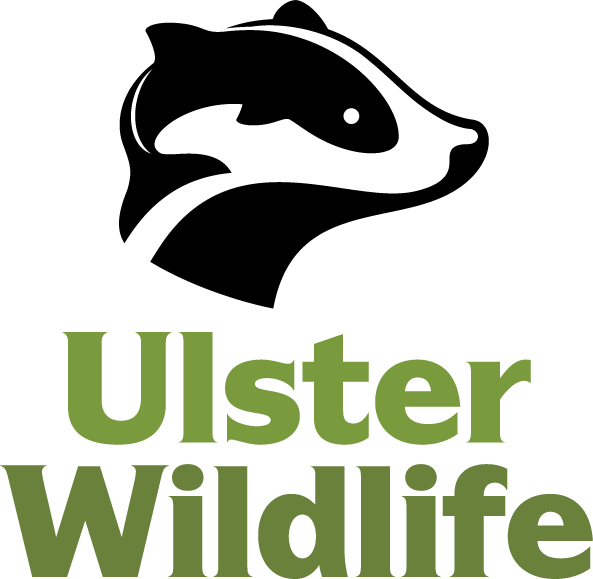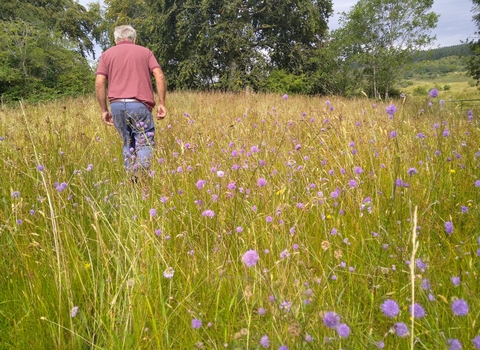Farming for Nature's Recovery
Over 75% of Northern Ireland’s land is farmed in some way – so how this land is managed has a huge impact on wildlife. If we are to put nature into recovery and create bigger, better and more joined-up spaces for nature to thrive, we must support farmers and landowners to create and restore a thriving natural environment alongside food production.
What we're doing
Managing our own land
We care for 857 hectares of land and own one working hill farm which we manage as nature reserves for wildlife, in partnership with local farmers.
On our nature reserves, we practice sustainable environmental land management, using techniques such as conservation grazing. Grazing is the most natural form of management for certain habitats such as species-rich grassland. Livestock can access areas that machinery can’t, and the impacts of grazing are slower than other methods, such as burning or cutting, which means that less-mobile wildlife can thrive. We work closely with local farmers to help manage wildlife sites with traditional and native breed cattle, such as Irish Moiled at Slievenacloy Nature Reserve.
Working with farmers through the EFS Group Programme
500 farms across Northern Ireland are signed up to Ulster Wildlife's Environmental Farming Scheme (EFS) Group Programme helping to deliver nature conservation at scale across Northern Ireland. This allows us to influence the management of up to 50,000 hectares of farmed land, with 14,000 hectares under the EFS agreement.
Funded by the Department of Agriculture, Environment and Rural Affairs (DAERA), with a focus on flower-rich wet grasslands unique to west Fermanagh, the Group is one of five pilot schemes in Northern Ireland, designed to support farmers who have joined EFS to deliver nature benefits.
EFS is the current form of agri-environment support for farmers in Northern Ireland. DAERA pays farmers additional income for managing land, creating habitats, or delivering outcomes for biodiversity following a set of management prescriptions.
Farmers who sign up can avail themselves of group and individual mentoring on various topics related to farming and wildlife. Our facilitators help farmers understand the application process, the implications for their farm management, and how to maximise wildlife benefits from the scheme – this greatly increases uptake and farmer satisfaction. Once a farm is in EFS, we make a follow-up visit, at least once a year, to ensure that habitat management is working and to answer any queries. We can also help identify any areas of concern and minimise risks of accidental non-compliance with the scheme.
Meet some amazing EFS farmers
The Corrigan Family
The Corrigan family lives on the shores of Lower Lough Erne and they have a farm at Portnacloyaduff in west Fermanagh. They graze their species-rich grass and woodlands extensively with beef cattle and have long supported agri-environment schemes. They deliver multiple ‘public goods’ such as wildlife habitats, flood protection, and carbon storage. Active membership of the EFS Group enables them to add to their already extensive knowledge of wildlife and vice versa for our own staff.
Despite being poorly drained, hard to access and difficult land to work, the Corrigans continue to assist wildlife across the whole farm. For instance, come September, the slopes of Blackslee Hill are ablaze with devil’s-bit scabious (locally known as blue button) – the food plant of the endangered marsh fritillary butterfly. Their EFS agreement encourages appropriate grazing management for species and habitats like this, and Roger has been known to contact the office when the blue button is at its best. Meanwhile, back at the farmyard, the Corrigans have red squirrels and play host to hedgehogs and swallows in the spring. They also grow pollinator-friendly species around the garden.
As the geese fly in over the lough, the conversation is infinitely enriched by Roger’s lifetime of observations. As he comments, “I love to enjoy my surroundings, and sometimes all it takes is to stop a while and nature will come to you.” One thing is for sure, high-nature-value countryside like this needs farmers like the Corrigans.

Jane and Roger Corrigan
Nigel Irwin
Nigel Irwin runs a mixed farm in the wildlife-rich valleys above Boho, west of Enniskillen, with dairy and beef cattle. Farming on the slopes of Aghnaglack – an Area of Special Scientific Interest (ASSI) –and one of the few remaining hotspots for species-rich grassland, Nigel is fully aware of the importance of his careful stewardship. He remarks, “I try to ensure that the land is kept in good condition and that the wildlife it supports can thrive.” In practical terms, this can mean cutting the rushes late in the season to allow the devil’s-bit scabious to set seed, even though the scheme allows cutting from 15 July onwards.
The purple moor grass fields that Nigel farms are some of the best examples of this habitat remaining in the country. Many years of good grazing and cutting management have developed a tussocky grass structure, featuring successive swathes of orchids, ragged robin, and other species. On an early September day when we walked the fields, small tortoiseshell butterflies filled the air, busy nectaring on late-season species, like the scabious. As an EFS Group member, Nigel has learnt what to look for when recording marsh fritillary larval webs and notifies us when he locates them. As he says, “The Group helps knowledge-transfer and brings farmers together to discuss solutions to the many challenges of farming this type of land.”
Crucially the EFS Group has secured membership for all the farmers involved in managing Aghnaglack ASSI. Landscape-scale benefits can therefore accrue from everyone pulling in the same direction, securing a de-facto ‘nature reserve’ for years to come. Assistance with rush cutting, scrub clearance and fencing infrastructure maintains and expands species-rich farmland though the scheme and Nigel for one is proud of his ongoing involvement.

Nigel Irwin
Contact
Dr Peter McEvoy, Director of Land Management (EFS) at Ulster Wildlife
peter.mcevoy@ulsterwildlife.org





